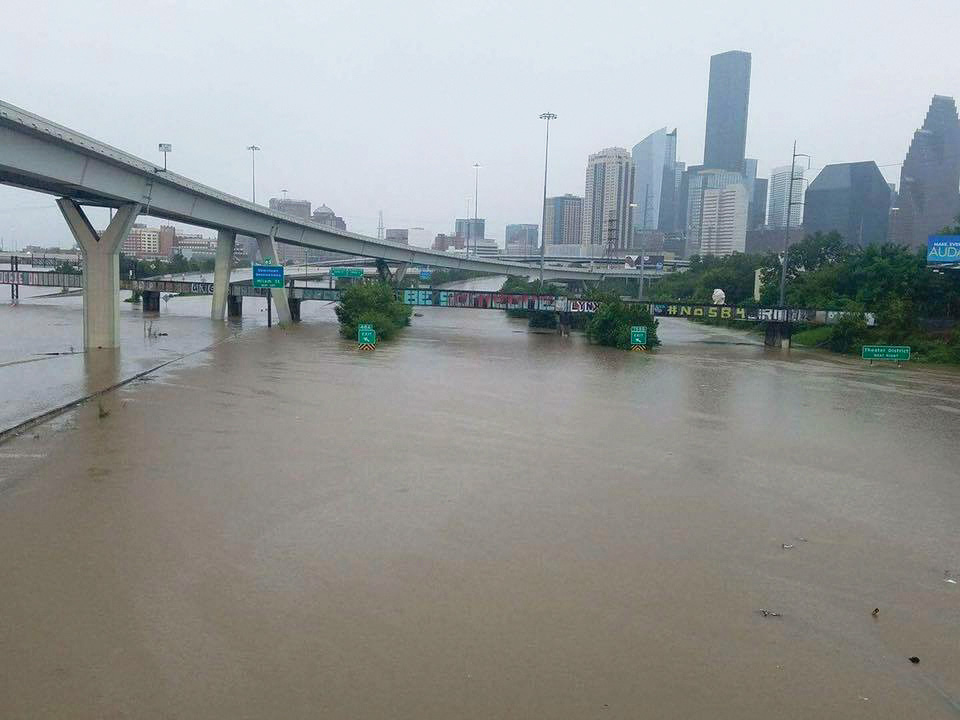The Buzz: October 2017

Hurricane Harvey came to Texas on August 25, which everyone is aware by now, but some may not be aware the magnitude of flooding that will affect the Galveston Bay System. Nearly every community surrounding the bay complex was affected and hundreds of thousands of homes and businesses were ruined by the rising floodwaters. It has been estimated (no clue how they do this) that something approaching 18-trillion gallons of water came down during this event – making it the single largest flooding event in U.S. History.
Where I live, on the north end of Trinity Bay, the area was inundated with 56-inches of rain. We have never seen such an amount of fresh water. Even though this isn’t our first rodeo on fishing behind major floods, this one is going to be especially hurtful. My only hope though, is being that this was such a quick and almost flash flood event, the water will not continue to arrive for a prolonged period.
For instance, two years ago during the historic Trinity River flood, the Livingston Dam discharge reached 93,000 cfs (cubic feet per second) and hung there for several days and then dropped to 80,000 cfs for over a month and a half.
The day the severe Harvey flooding occurred here, the Livingston Dam discharge reached 110,500 cfs – the highest it’s ever been. BUT 5 days later, it had diminished to only 18,000 cfs. My theory is that we should recover faster, being that there isn’t a continuous flow and more or less just a huge flush! Eighteen trillion gallons is nothing to take lightly though, we will have to see how long that water will take to get out of here. Luckily though, it’s done coming in!
There are also several key factors which will aid this fresh water, get out of here. Depending on how warm the temperature remains and for how long, will determine how much evaporation will occur. The surface water, which is mostly all of the fresh water, will evaporate and we should get some relief there. The biggest key to our recovery though will be tide movement and the amount and strength of the cold fronts that will push existing fresh water out of the bays. This won’t be the end of the world and we will make a comeback. We’ve been here before.
The closest thing to this event that we’ve experienced in somewhat modern time can be related back to 2001 when Tropical Storm Allison hit us. It wasn’t nearly as bad as Harvey but it entirely inundated our bays. The first area to really produce signs of life was West Galveston Bay. West Bay isn’t as drastically affected by fresh water inflow, being that it’s far enough away from the San Jacinto and Trinity river watersheds and is really only affected by smaller bayous and creeks.
West Bay is definitely where we’re going to need to focus most of our time behind this flood. Trinity Bay will be a thing of the past for some time. Our normal fall routine of working birds and slicks on the north end of Trinity Bay during a normal October isn’t going to happen this year – but maybe next year!
East Galveston Bay should bounce back in due time but as of right now, it’s toast as well. Normally we’ll see a silver lining around the south shoreline after floods. Areas like Fat Rat pass and around the Hog Pens will hold pockets of saltier water eventually. The Jetties will be a big player this year, being that a lot of the fish living in the northern stretches of the bay evacuated with the flood and rode that stream of saltwater out into the gulf. Fishing the jetties will be as close to the incoming favorable salinity as you can get and will be a good place to look.
Whenever the salinity does begin to recover further up the bay, enough to fish, fishing slow and low will be the key. The salt water is heavier than fresh and will always lie in a layer near bottom. Fishing on bottom and keeping your lure there is a huge key to success. You’ll need to increase your jighead size or be patient and let your lure get all the way down. The fish will be hugging the bottom, looking for the areas with the most salinity.
Don’t get too frustrated with the conditions and the difficulties that may arise. The fishing will come back and better days are coming!
-Capt. Caleb Harp
